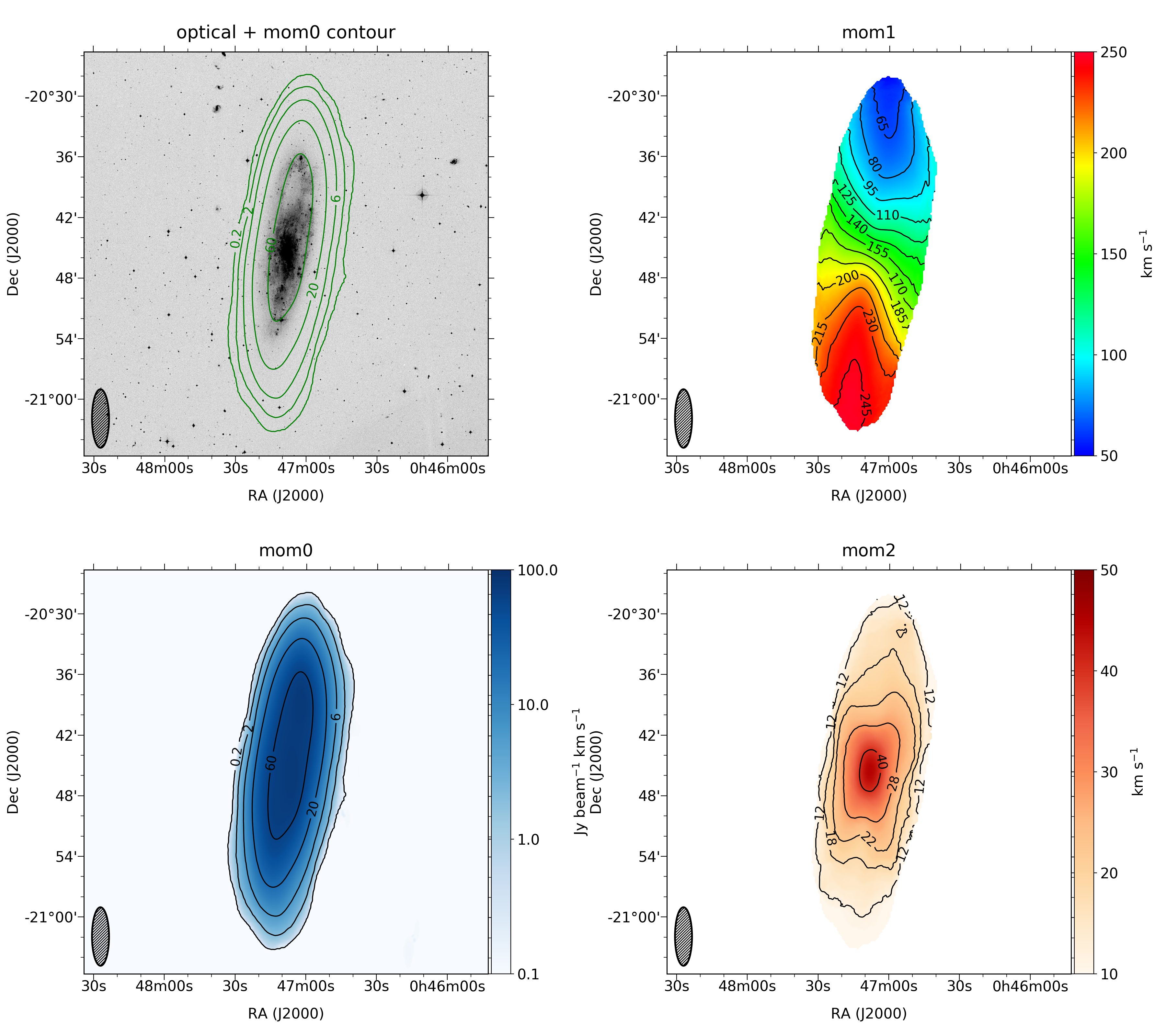NGC 247

NGC 247 (HIPASS J0047-20)
is a late-type spiral galaxy at a cepheid distance of 3.65 ±
0.17 Mpc (Madore et al. 2009). This value agrees with its TRGB distance
estimate by Karachentsev et al. (2006). Our ATCA HI moment maps show a mildly
warped, regularly rotating disc extending about a factor two beyond the stellar
disc. We measure FHI = 662.5 Jy km/s, about 10% higher than the
HIPASS value (Koribalski et al. 2004).
High-resolution, single-pointing VLA HI maps were obtained by Carignan & Puche
(1990b) and Ott et al. (2012), who measure FHI = 528 ± 18 Jy
km/s and 382.6 Jy km/s (VLA-ANGST project), respectively. Both are missing
substantial amounts of HI gas due to the lack of very short baselines and
limited field-of-view. NGC 247's closest neighbour is the dIrr galaxy ESO
540-G031 (HIPASS J0049-20; UGCA 015).
The large spiral galaxies NGC 247 and NGC 253, together with the dwarf galaxies
ESO 540-G030, ESO 540-G031 and ESO 540-G032 form another small association
(D ~ 4 Mpc) within the Sculptor Group.
Reference:
Koribalski et al. 2018
* LVHIS database
* LVHIS homepage
* next
In the following we briefly discuss three faint dwarf galaxies (ESO 540-G030,
ESO 540-G031, and ESO 540-G032) near NGC 247; these are not part of the LVHIS
galaxy atlas presented here. Karachentsev et al. (2003) obtained TRGB distances
of 3.40 ± 0.34 Mpc (ESO 540-G030), 3.34 ± 0.24 Mpc (ESO 540-G031),
and 3.42 ± 0.27 Mpc (ESO 540-G032), suggesting that this dwarf grouping
lies slightly in front of the spiral galaxy NGC 247.
ESO 540-G030 is a low surface
brightness dwarf galaxy. Jerjen et al.
(1998, 2000) measured an integrated magnitude of BT = 16.37 mag and
an SBF distance of 3.19 ± 0.13 Mpc. In addition to a large number of red
stars, Karachentsev et al. (2003) also detect a number of blue stars in the
central region of ESO 540-G030, suggesting that it is a transition dSph/dIrr
type galaxy. Deep Parkes and ATCA HI observations were presented by Bouchard
et al. (2005), resulting in a tentative detection. They derive a total HI
mass of 8.9 ± 1.9 × 105 M☉; and note a
positional offset between the HI gas and the stellar component.
ESO 540-G031 (HIPASS J0049-20)
is a dwarf irregular galaxy at a TRGB distance of 3.34 ± 0.24 Mpc
(Karachentsev et al. 2003), located only 40 arcmin east of NGC 247. The HIPASS
BGC gives FHI = 3.9 ± 1.5 Jy km/s and vsys = 294
km/s (Koribalski et al. 2004). HI maps of ESO 540-G031 (UGCA 015, DDO 6)
obtained with the GMRT (Begum et al. 2008) and the VLA (Ott et al. 2012) show
FHI = 2.6 ± 0.3 and 1.2 Jy km/s, respectively. Using our
low-resolution ATCA HI mosaic of NGC 247 and surroundings we measure
FHI ~ 3.2 Jy km/s for ESO 540-G031 and derive MHI = 8.2
× 106 M☉ (see also Warren et al. 2007). The
HI emission of ESO 540-G031 is offset towards the south-western side of the
stellar body. Its relatively bright GALEX UV emission suggests
significant star formation (SFR = 1.4 × 10-3
M☉/yr; Ott et al. 2012).
ESO 540-G032 is another
transition-type dwarf galaxy. Parkes and ATCA HI data by Bouchard et al. (2005)
suggest a centre velocity of 228 km/s. The detection was later confirmed by
Da Costa et al. (2008) who also obtain new HST-ACS optical data, deriving a
TRGB distance of 3.7 ± 0.2 Mpc and MHI = 9.1 ×
105 M☉. Their ATCA image shows an HI source with
a faint eastern extension.
Reference:
Koribalski et al. 2018
* LVHIS database
* LVHIS homepage
* next